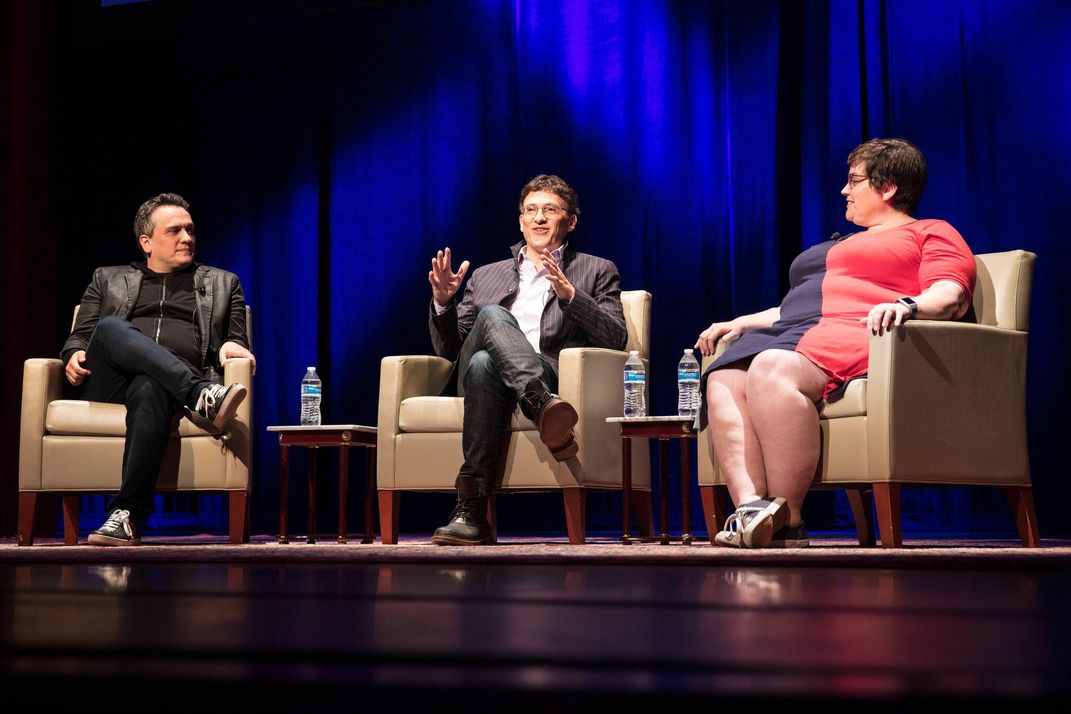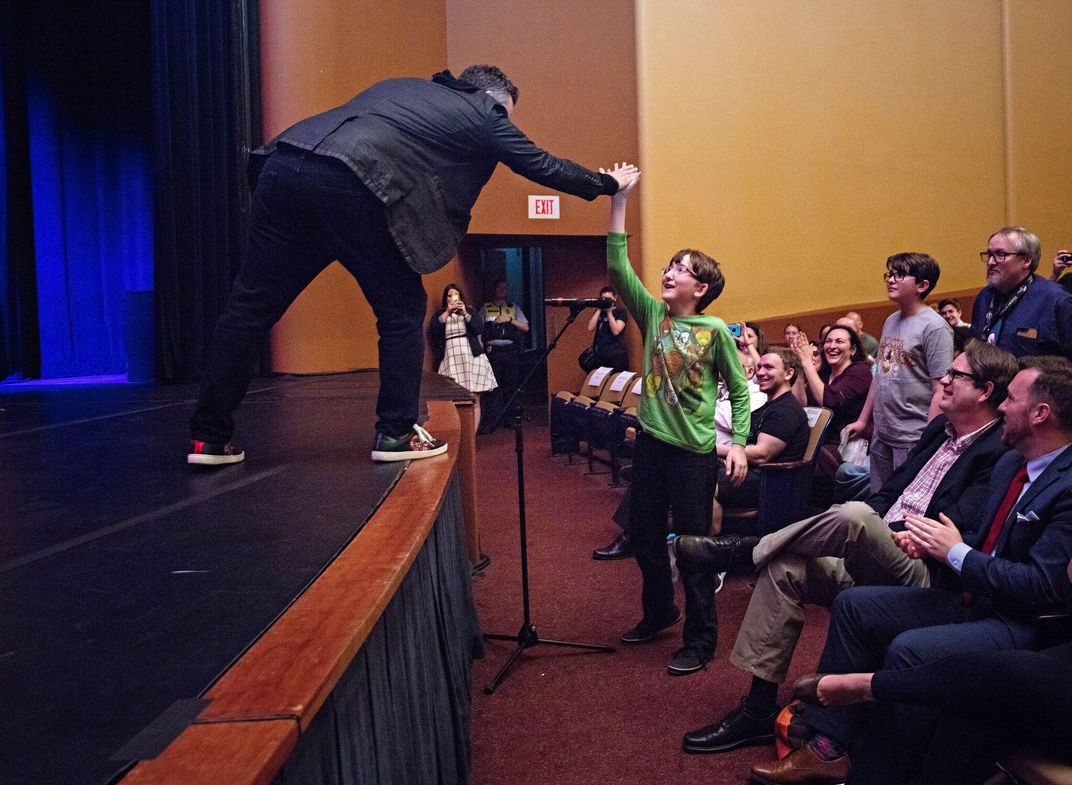How the ‘Infinity War’ Directors’ Childhood Gave Them the Guts to Pull Off That Ending
Marvel comes to D.C. to delve into Avengers spoilers and make a Smithsonian donation
/https://tf-cmsv2-smithsonianmag-media.s3.amazonaws.com/filer/8e/fc/8efc3550-6422-4094-8ed9-408ef98a5abd/thanos1.jpg)
Without the aid of an Infinity Stone or two, winding up in the same room as the directors of Marvel’s Avengers: Infinity War and gaining access to their thoughts may seem a tall order. But a special event in early May hosted by the Smithsonian Associates afforded the public just that opportunity, as filmmaking brothers Joe and Anthony Russo deconstructed their creative process for a packed auditorium in a discussion with NPR pop culture writer Linda Holmes.
Deconstruction, as it turns out, is an art with which the brothers Russo have ample experience. Captain America: The Winter Solider—the first Marvel film helmed by the Russos—was a dark and disillusioning breakdown of the complexities of modern America, a deep dive into the ethical morass of the surveillance state which, per Joe Russo, “deconstructed the authority structure of the Marvel Universe, and the essence of who Cap is.” Once a paragon of World War II-era American pride, Steve Rogers (a.k.a. Captain America) was forced to seriously question the legitimacy of his own government, and was set on “a journey from patriot to insurgent.”
Unpacking and muddling the concept of American heroism has endured as a central goal for the brothers in their subsequent efforts. “Captain America: Civil War deconstructed the core Avengers,” said Joe. “It’s a Kramer vs. Kramer, an irreconcilable divorce between the characters. And Infinity War,” he adds with a knowing smirk (and to pained groans from the audience), “deconstructs the entire universe.”
The Russos’ subversive and nuanced take on the Marvel Cinematic Universe is well embodied by one of the items they donated to the Smithsonian Institution as a part of the festivities: Captain America’s iconic red, white and blue shield, traditionally a symbol of humble strength and unwavering conviction. The donated prop, which saw use on the set of Winter Soldier, has come to represent a far less naïve character and country than it once did, says the culture and arts curator Ryan Lintelman at the National Museum of American History.
Films like The Winter Soldier, Lintelman contends, speak to our unease as citizens grappling with the knotty questions posed by 9/11. “They capture the zeitgeist,” he says, impelling us to confront “forces in the world that are poorly understood, that seem alien or foreign.” They also get us to take a long hard look in the mirror, and ask what patriotism really means. In the case of 9/11, Lintelman says, “the government failed, and so that’s a lot of what happens in these movies—they look at questions of freedom vs. security and so on.”
Joe and Anthony Russo trace their questioning impulse as filmmakers back to their (comics-filled) youth in Cleveland, Ohio, a city Joe recalls was lambasted time and again on 1970s late-night television for its water pollution and financial woes. “We grew up with this kind of punk rock attitude,” Joe says of him and his brother. “You don’t care, ’cause you’re the underdog.”
/https://tf-cmsv2-smithsonianmag-media.s3.amazonaws.com/filer/14/1c/141ca1a1-48a0-4a55-8558-2ff62357f1ba/marvel3.jpeg)
As they carved out a name for themselves in film and television (“Arrested Development” and “Community”), Joe and Anthony became renowned for their commitment to authentic, nuanced storytelling. It was for this reason that they were ushered into the Avengers fold by Marvel president Kevin Feige.
Anthony Russo had nothing but praise for Feige at the event, going out of his way to highlight the surprising amount of creative freedom granted to him and Joe by the overarching franchise establishment. No one’s denying the astounding financial stakes behind the scenes of each Marvel movie—“When you spend a billion, you hope to make it back,” Joe deadpans—but Anthony maintains that his and his brother’s imagination was never truly fettered by scheduling or budgetary concerns. “There’s a very complex business endeavor to figure out how to make these movies that is a miracle in itself,” Anthony says, “but Marvel will never let that drive the train, which is why we love them.”
In light of the seemingly superhuman amounts of time Anthony and Joe Russo have personally poured into Infinity War and its 2019 sequel (which they’re referring to as Avengers 4 for now), this profession of love for Marvel is not difficult to buy. “We started shooting Infinity War in January of 2017,” Joe says, “and we just wrapped Avengers 4 in January of 2018. We ran back to L.A., finished edits on Infinity War, which we were editing the whole time we were shooting 4, and handed it in the day we got on a plane, on April 7, to do an international press tour. . . which we’re still on.” In sum: “It’s been a crazy year.”
The other objects the Russos donated to the American History Museum—a pair of matching director’s chairs from the set of Infinity War—speak to both their zeal and their penchant for constant collaboration. Known for bouncing ideas back and forth—between each other and with directors of affiliated Marvel movies—the brothers also take a decidedly hands-on approach when it comes to the talent in their movies, indulging improvisation where applicable (That scene in Infinity War with Chris Pratt’s insecure Star-Lord and an unconscious Thor? 50 percent ad lib) and taking turns intervening when necessary.
Infinity War is chock full of unexpected, often comical interactions between characters from different ends of the Marvel spectrum. By way of example, Joe Russo dissects the chemistry between Tony Stark (Robert Downey Jr.) and Stephen Strange (Benedict Cumberbatch)—a pairing hitherto undreamt of.

“We sit around and think, wouldn’t it be interesting to take two narcissists, one a man of science and the other a man of magic, and put them in a room together to fight it out like two betta fish in a tank?” Russo says. “We knew we could get combustibility. A lot of entertainment comes through conflict.”
Taking characters in unexpected directions also entailed deceiving the audience, even in pre-release trailers which were altered to misrepresent key moments from the new film. One of the most striking red herrings from the body of the movie (okay, this is where it gets spoilery, folks), what the Russos refer to as the “hero’s journey” of Thor (which spans the trauma of the movie’s opening moments and the Asgardian’s exertions in pursuit of the Stormbreaker battle axe), conceals the fact that, at the end of the day, this film is all about Thanos. “Thor was put on a hero’s journey to convince you—he put enough energy into that journey—that he would win the movie,” says Joe. “But if you go back and look at the structure of the film, all the key moments of the plot are driven by Thanos.”
The towering bass-voiced villain, portrayed by Josh Brolin, comes off with shocking emotional depth, and his quest to rid each planet in the universe of half its residents to avoid the overpopulation problems that doomed his own world seems at times an unsettlingly reasonable venture. Part of the reason Brolin’s performance of Thanos is so compelling, Anthony Russo explains, is that Brolin was physically on set with the other actors during every scene, lording over them in real life with the aid of platforms and Styrofoam prosthetics. Not only that, but every aspect of Brolin’s facial expression was rendered digitally in real time with cutting-age performance-capture technology—the sort fans of hyperrealistic video games like Beyond: Two Souls and L.A. Noire may already be acquainted with.
“One of the things we got to lean on in this movie, with Thanos in particular,” says Anthony, “is the ability to take a performance of an actor like Josh Brolin, capture every nuance of what he does in performance, and map that onto an eight-foot-tall alien body.”
This technology allowed the Russos to bring real depth to what could have been a monolithic Big Bad. “Our process when dealing with characters with extraordinary powers or strength has always been: How do you make them vulnerable?” Anthony explains. “They don’t become real and relatable and empathetic until you appreciate their limitations and vulnerabilities.”

For all its wacky juxtapositions and amusing moments, Infinity War is ultimately a story with a lot of hurt to go around—even for Thanos, whose daughter Gamora Joe Russo terms (with a supposedly unintentional pun) the “soul of the movie.”
Asked which death in Infinity War rocked them the most (serious spoilers coming), the Russos immediately turn to Spider-Man, the high school-age web-slinger who does his best to lend a hand in a struggle beyond his comprehension only to be coldly and arbitrarily snuffed from the universe in the final moments of the film.
“Spider-Man was my favorite character growing up,” says Joe. “When you have a connection to a story from childhood, that’s had a significant emotional resonance for you throughout your life, and that character in particular being the age that he is. . . We felt that that would potentially be the most painful.”
Avengers: Infinity War may be a box office-smashing superhero movie, but it is also an incisive and subversive look at the ravages of global life in the 21st century, and at the impossible decisions we must face as we confront them.
“The theme of this movie is: What does it cost to be a hero in a world where there are no easy answers?” Joe Russo says. “I think we do live in a world where there are no easy answers. And frankly, sometimes villains win.”
/https://tf-cmsv2-smithsonianmag-media.s3.amazonaws.com/accounts/headshot/DSC_02399_copy.jpg)
/https://tf-cmsv2-smithsonianmag-media.s3.amazonaws.com/accounts/headshot/DSC_02399_copy.jpg)